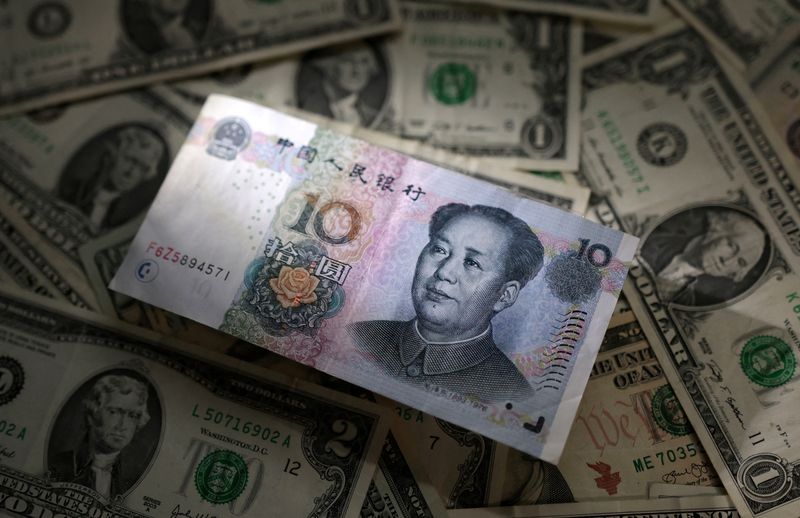SHANGHAI (Reuters) -China's major state-owned banks were seen busy selling U.S. dollars to buy yuan in both onshore and offshore spot foreign exchange markets this week, people with direct knowledge of the matter said, in an attempt to slow the yuan's depreciation.
Though they also trade on their own behalf or to execute clients' orders, state banks often act at the behest of the central bank when the yuan is under pressure, as it is now.
"State bank dollar selling has become a new normal to slow the pace of yuan depreciation," said one Shanghai-based trader.
Offshore branches of the state banks were also seen selling dollars during London and New York trading hours this week, two sources with direct knowledge of the matter said on Thursday.
Such dollar selling could limit falls in the offshore yuan and prevent it from diverging too far from its onshore counterpart.
The yuan has lost about 2.4% against the dollar since this month, and 6% since the start of the year. The onshore yuan traded at 7.3145 per dollar as of 0442 GMT, while the offshore yuan last fetched 7.3400.
The recent steepening in the yuan's decline is a result of China's widening yield differential with the U.S., and investors' mounting concerns over China's weak economic growth and rising default risks in its property and shadow banking sectors. [CNY/]
The government's slow delivery of stimulus measures to bolster growth has disappointed investors. Meantime, the People's Bank of China (PBOC) has eased monetary policy to support the economy, though the price paid for lowering interest rates is more pressure on the yuan.
This week, yield differentials between China and the U.S. widened to their highest in 16 years, as investors speculated that the PBOC would ease policy further after a surprise rate cut this week, even if it puts the yuan under more pressure.
During recent weeks, market watchers say the Chinese authorities have sought to slow the yuan's decline, with the PBOC persistently setting a stronger-than-expected fixing, and state banks repeatedly selling dollars.
Similar tactic were seen in September 2022, when the PBOC also asked major state-owned banks to be prepared to sell dollars for yuan in offshore markets as it tried to stem the yuan's fall.
In July, the central bank adjusted a parameter to allow companies to borrow more overseas, so that they could bring in foreign currency to be converted onshore, thereby supporting the yuan. But the higher interest rates charged on overseas loans remain a deterrent to borrowing abroad, undermining the impact of that policy tweak.
One tactic that does appear to have worked is state banks offering to lend less yuan in the offshore Hong Kong market, as liquidity tightness there helped to limit the yuan's decline this week, traders said.
Hong Kong's overnight yuan borrowing costs jumped to the highest level since April 2022 on Wednesday, with the CNH Hong Kong Interbank Offered Rate benchmark (CNH HIBOR) rising across the board.
The liquidity squeeze was not very drastic as aggressively mopping up yuan liquidity from that market could adversely affect bond market sentiment, one banker noted.
